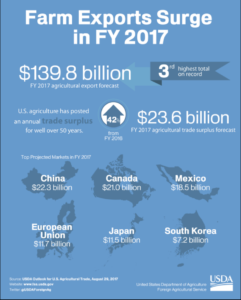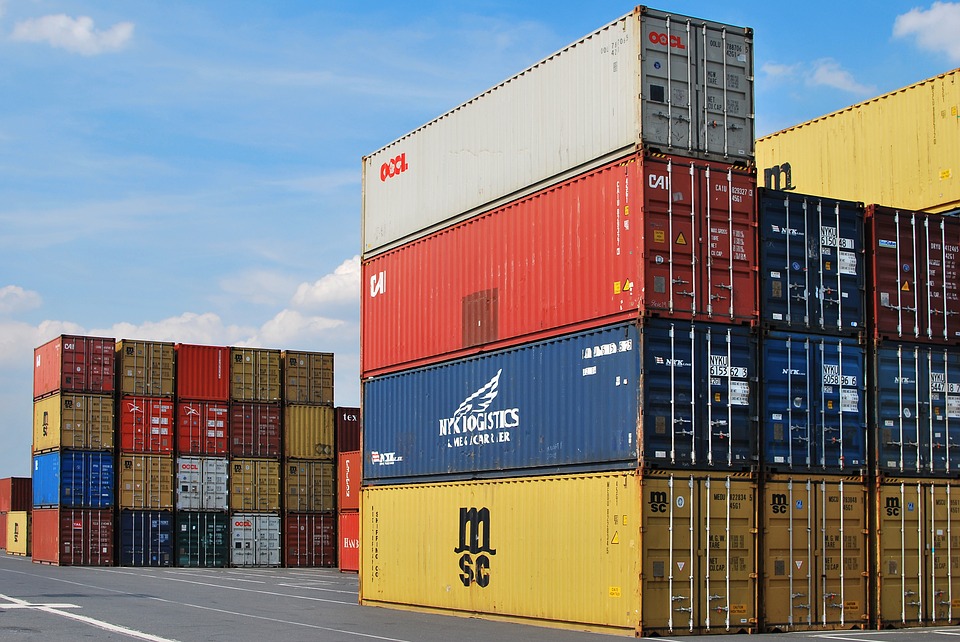As tense NAFTA talks continue, the food industry is keeping a close eye on the outcomes.
After all, U.S. agricultural exports are up…
According to USDA’s forecast, farm exports will surge to $139.8 billion for FY 2017 — the third highest on record.
Additionally, the agricultural trade surplus is up 42% from FY 2016.

These strong markets are bracing for NAFTA outcomes. They also know that Mexico and Canada are critical to the food industry and its economy.
Plus, if there are any major changes to NAFTA, the effects are sure to touch all food industry-related businesses.
What’s at stake for the food industry with NAFTA talks
In the “U.S. Food and Agriculture Dialog for Trade” letter (written to President Trump early this year), food industry leaders describe food and agricultural exports as “a successful and valuable part of the U.S. economy.”
The letter goes on to say that this success is largely due to the trade relationship between the U.S., Mexico and Canada — one based on “economic cooperation, integration and policy alignment.”
Also, NAFTA partners Canada and Mexico are the U.S.’s second and third largest farm export markets. They have a projected $39.5 billion market value (FY 2017).
So, depending on the NAFTA negotiation outcomes, food industry businesses could see changes in product access and pricing due to market disruptions.
And if trade relations weaken
Trade between the U.S. and Mexico has increased fivefold since 1994. What’s important, too, is that the two countries have experienced similar growth rates of agricultural exports. And this reflects the “mutually beneficial outcomes NAFTA has provided.”
Yet, the U.S. administration, claiming the trade agreement as “the worst trade deal ever made,” risks jeopardizing these mutual benefits.
Additionally, the administration views trade deficits as bad – the main reason they wanted to walk away from NAFTA. They want to do this even though the U.S. has a trade surplus with Canada – the farm exports’ strongest market after China.
Ultimately, no one knows how the NAFTA talks will end. But if these healthy trade relations weaken, the effects could be far reaching.
For example, businesses like the railroad company Kansas City Southern get a lot of their business from cross-boarder trade.
Also, for the apple industry, disrupting trade relationships could lead to increased tariffs and smaller earnings for some 7,500 growers and their employees.
So, regarding China…
Certainly, NAFTA has its demons. And as its terms unfolded over the decades, U.S. factories closed. Many people lost their jobs (President Trump’s “stump” argument for dismantling NAFTA).
But NAFTA was not the only reason for U.S. manufacturing collapse. As leading economists assert, “Manufacturing in the United States was under stress decades before [NAFTA].”
In fact, China had a greater impact on U.S. jobs once it joined the World Trade Organization (WTO).
But NAFTA means more than manufacturing jobs
Thanks to NAFTA, farm exports to Mexico and Canada continue to boost the U.S. economy. And when an industry has solid trading partners – with relationships built on cooperation — it grows. And that means people have jobs.
Plus, if NAFTA negotiations result in a Sunset Clause, effectively letting NAFTA expire in five years unless trading partners agree to keep it going, businesses will feel the effects of the industry’s uncertainty.
Additionally, if proposed changes to NAFTA disrupt farm export supply chains, markets will react. And that could affect the bottom line for the businesses dependent on agricultural products.
It seems inevitable that NAFTA talks will result in policy change. In the meantime, food industry businesses might want to consider the possible effects.
At Ingredient Exchange, we, along with our food industry customers, are watching the NAFTA talks with great interest. We’d love to hear your thoughts in the comments on the negotiations and how the outcomes may affect the food industry.
While we don’t know how the NAFTA talks will end, Ingredient Exchange will be here to get you the best price for your ingredients. So, if you need help accessing or offloading your ingredients, feel free to get in touch with us here.



